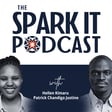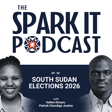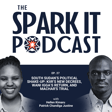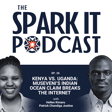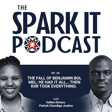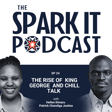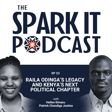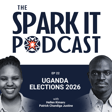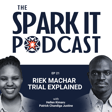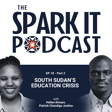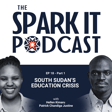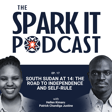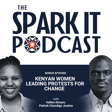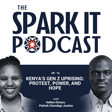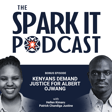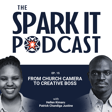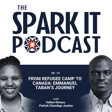Become a Creator today!Start creating today - Share your story with the world!
Start for free
00:00:00
00:00:01

Breaking Barriers: Naom's Journey to Women Leadership
In this episode of the Spark It Podcast, Naom takes us through her inspiring leadership journey.
From breaking the glass ceiling as a leader in the nonprofit sector championing women and girls empowerment; to how she has taken up leadership roles all the way from when she was a child. To her, leadership is not about having all the answers but its about influencing people and giving them the power to occupy space.
She shares that to address the gender gap, more representation is needed and why its important for women to share their achievements with the world. This is a must listen episode for anyone who is getting started on their leadership journey or needs inspiration to keep moving
Transcript
Introduction to Spark It Podcast and Naum's Work
00:00:00
Speaker
Welcome to the Spark It podcast where we bring you inspiring conversations that actually spark your interest to do more. And I'm your host, Helen Kimaru, and today I'm thrilled to be joined by an incredible leader.
00:00:11
Speaker
Now, someone I have known for over 10 years, actually. She's a senior program and HR manager for a nonprofit. And for the last decade, Naum has been at the forefront of championing women and girls' empowerment in the various roles she's held in the places she has worked.
00:00:32
Speaker
She also has a a CBO. It's called Cuesa Health Initiative. And yeah, and she's also helping her community and especially people who come from vulnerable backgrounds.
00:00:46
Speaker
with
Naum's Leadership Journey and Motivation
00:00:47
Speaker
her initiative. It's truly amazing to see young people making an impact in their communities. So today we are going to take a deep dive into leadership journey and also her work with women, her community, and also what motivates her as a young leader. So now, welcome to the Spark It podcast.
00:01:06
Speaker
Thank you. Yes, I'm excited honestly to host you. Thank you for making the time and I look forward to, you know, having a cands conversation with everyone. Yeah. Thank you. Thank you so much. I appreciate it.
00:01:22
Speaker
Yeah. Thank you. Thank you, honestly, for making the time. So before we even di take a deep dive into your sort of ah leadership journey, could you probably tell us how it has always looked like from sort of a young age and, you know, just give us sort of like a beginning how it started.
00:01:41
Speaker
so focus I focus on my leadership journey. yes ah It started way back before I even knew what leadership is. um From childhood, as a first born child, I had no option but to lead my family.
00:01:58
Speaker
And wherever I found myself, at church, at at school... I was always leading, not as a leader, but the child who takes initiative to organize other kids to do things or get things done.
00:02:13
Speaker
ah More about her, or I was raised by my parents, my father being the most... ah the most pillar or rather the person who wanted me to be a leader or led me to be a leader. And growing up from primary school, being elected as a leader ah in the libraries, head girl, name it, all that. And then coming to high school, still in leadership to college All the way.
00:02:42
Speaker
I think as long as um ah I can remember, I've always been a leader. That's all I know. like Wow.
00:02:52
Speaker
It's like you are always that kid who takes initiative. Yes, yes. And it's natural for me. I can say it's been natural for me. Yeah, honestly, the fact that I have worked with you at some point in my life, I do know for sure.
00:03:06
Speaker
you're You're always on top of things, honest honestly, and that's a really amazing thing. So how did, say, for example... those formative moments for shape like your sense of purpose and drive from when you were a kid and to you know now that you've told us about all the roles you've been or all the places you've been able to occupy like leadership you know positions, how did that look like?
00:03:29
Speaker
How did that shape your sense of purpose and drive?
Realizing Leadership as a Calling
00:03:33
Speaker
Actually, It's ah the motivation that I get from the results of the leadership who instances that I take.
00:03:45
Speaker
So for instance, if you are leading a team and you achieve a result or there is some impact, form of impact, it gives you motivation to continue. And then leading in initiatives that talk to your soul who is what has led me to Like find my purpose and, and fuel it even further.
00:04:09
Speaker
Nice. Yeah. So at what point did you feel like now i was just born to be a leader? Cause you've always been a leader, but at the at what point did it click for you that this is what I was called to do?
00:04:23
Speaker
think I would say in my twenties, which came with a sense of realization um, learning more about myself and understanding that what I was doing was not just, um, uh, it was not just, what can I say? Uh, a responsibility, uh,
00:04:46
Speaker
it's more of a calling nice yeah it's more of a calling so in my 20s when i was a volunteer with kenya red cross society in uh in nakuru county and it was not being paid it's not a paid position it was a totally voluntary activity I connected with people. I could see impact, like leading other volunteers, going around helping victims of accidents, and reaching out to communities, finding out their needs. We did some needs assessment, like what the communities needed, and compiling a report, presenting it. And then in their in the process of presenting those, i was able to make connections with people.
00:05:32
Speaker
Some of those people became mentors, others lifelong friends so so i i was seeing like ah this kind of work that i was doing was actually creating impact okay yeah nice wow So I thought, like, I have to, like, whatever I do, it's impacting somebody's... It may seem small, but in the in the long run, it's um impacting somebody in a big way.
00:05:57
Speaker
Wow. For it could be small, but for the people who are being impacted by your initiative, so your leadership, it's a lifelong thing. Yeah. And you also talked about the fact that it's voluntary. It's not like somebody is paying Yeah, it's voluntary. So...
00:06:11
Speaker
ah So it kind of gives you like a more bigger sense of purpose. Yes, yes.
Evolving Leadership Style and HR Influence
00:06:16
Speaker
Wow, that's amazing. So how do you think like maybe your leadership has evolved over the years in the different initiatives you've been, you know, entangled in, whether it's you coming up with a CBO or you volunteering at the Red Cross or the work you actually do, how has that evolved in terms of your leadership style?
00:06:36
Speaker
it it's the lesson It's the lessons that I've learned and picked along the way. So when I was starting out, when I was a bit younger, ah I used to think that I should have all the answers. Don't we all?
00:06:54
Speaker
I used to think that I have to have all the answers, solve every problem that comes. But as I've grown, that has changed. In that, I've learned to listen, ask the right questions, And act on the... Like, at the moment or in the moment. Like, so... Like, help others. so Because ah the people we lead, in most cases, they're not people who don't know what they're doing. Yeah. Or people don't bring value. There are people who most... In most cases, they need you to ah clear the path for them to to see the way forward. And they'll come up with solutions that you will not even have thought about. So they make it a bit easier. So...
00:07:37
Speaker
Influencing people. so I've just come to learn about that. Do you think like you taking up a HR course, of course initially that's not what you did you pursued in college as your first degree, but do you think like taking up a HR course and getting certified also kind of contributes to now how your leadership style has evolved over the years?
00:08:01
Speaker
ah Yes,
Career Journey: Public Health to Program Management
00:08:02
Speaker
it has. don't know whether to say HR found me or I found HR. Interesting. Okay. ah So, human resources. How did I come into it?
00:08:14
Speaker
I came to... i had a different perspective out of what HR meant until I found out that it's all about leadership. Okay. And... helping people to achieve their goals as well as the organization's goals. So um when i When I started out, I can give a small background. Is that okay? Yeah, sure. Yeah, that's fine.
00:08:38
Speaker
My by background, my degree is in public health. And after public health, I i came to pursue programs or program management where I started out from internship and growing into like running programs that create impact.
00:08:58
Speaker
for women and girls, which was which is a part of the passion that is burning in my heart. And I found that I was always leading people. So for programs to for programs to run, you have to manage people.
00:09:12
Speaker
Yeah. Or el lead people. So as I was leading people, I came to realize that I needed additional skills, which I had to go back to school for further studies and pursued a master's in business administration, um concentration of strategic management, okay which is more of human resources. Yeah, true, true, true. Yeah, so ah gaining those extra skills from the classroom and led me to...
00:09:41
Speaker
led me to like grow in my leadership in human resources and I decided to certify my skills. So me getting a certification in human resources does not mean like that is what me, a HR manager, it was just certifying the skills that I had already yeah acquired over the 10 years for credibility. Yeah. Yeah. Interesting.
00:10:04
Speaker
Interesting. is yeah Okay. Look at you. So far for example, now that you work as a senior program manager and also a HR manager, how do you sort of like blend strategy with empathy and what does sort of like a typical day look like for you in your role?
Blending Strategy and Empathy in Leadership
00:10:24
Speaker
Okay. In human resources or in running programs, there is no single day that looks like the other. Like oh these are so different. You solve different...
00:10:36
Speaker
problems you wake up you're working on a policy that impacts people the next day you're talking about um interacting with people helping people like uh solve an issue conflicts like there's so many things so many different different things that blend into running programs and strategy so for me what i do is uh i always uh try to to to to dedicate.
00:11:07
Speaker
specific times to solve given issues. Like I have said, like on Mondays, I have strategy Mondays, so I'm thinking about strategy. Yes, I'll solve the in the moment ah issues that come up.
00:11:23
Speaker
yeah But then I know at the back of the mind, I have to look at the policies, improve them, a revise where they need to be there needs to be and reach out the other people to see what they think about it.
00:11:38
Speaker
um I think ah ah to learn that, you just have to be intentional, but also be flexible. So flexibility is what fuels the day. Because you wake up to totally different challenges every day.
Aligning Work with Purpose and Impact
00:11:54
Speaker
Wow. And also, like the kind of work you do, it's always about meeting people at their level of need, whether it's when you're working with women and girls or trying to solve a problem. Like, off-camera, we had talked about you, like you had had this feeding program for street kids with Cuesa Health Initiative, yeah.
00:12:16
Speaker
it It seems like you have sort of found your purpose in that line of work, like trying to solve a problem and especially for like the most vulnerable in the world. So how does your work align with deeper purpose and the change you hope to see in the world?
00:12:34
Speaker
Yeah, that's interesting. That's a very deep question. i know. I find it easy working on something that connects to your soul.
00:12:45
Speaker
And what I have grown up wishing or trying to see is to see a better world for majority of the people. Of course, you want to change the world, but you may not be able to change the world alone. So you will try to do your small thing, really your little thing. Yeah. That together with what other other people are putting up in the effort, you will you will see a change.
00:13:10
Speaker
So I put energy where it matters most to me. Wow. yeah So I try every single day like to prioritize things that are speaking to my soul. I don't just do anything or pick up any project. I'm intentional about the project that I can pick. wow The ones I can't, I can't step behind.
00:13:31
Speaker
I'm heavily involved in community community to work and of like not just my job, um with the community organization that I run, with a lot of charmers, with women and young people. yeah I volunteer in the church level. It's all about what matters to me.
00:13:51
Speaker
Like where do we want to create the impact? In most cases, it's in it's in women who and girls. It's in the vulnerable. kids with special needs while kids on the streets and in health i just have to mention health because i'm very passionate about health yeah and in health so all most of my programs or wherever my leadership is around that empowering women empowering young people helping the needy those in the streets who yeah and creating impact in the health sector
00:14:27
Speaker
Yeah, I like the way you said, like, for you, you try to look for something that speaks to your soul, and that's where you put, like, your time and effort. Because I feel like a lot of people out here, sometimes sometimes we struggle, and we end up, like, doing too much, or you are trying to do so many things at the same time, yet you and you don't achieve sort of anything because your efforts are all over there, like, sort of scattered.
00:14:51
Speaker
But that's that's, like, sort of, I think, like, a really good... lesson honestly for our listeners. Oh wow. So because for me like I usually say change a little corner of your world.
00:15:03
Speaker
That's like my mantra. yeah So for me I think your story sort of speaks to me because even for me when when I'm thinking about what next to do I'm trying to you know, small maybe small efforts with small groups but big impact instead of putting effort in a lot of, you know, other things.
00:15:23
Speaker
So because you've done a lot of things, honestly, and especially working with communities, is there like a story or a moment that stands out for you when you maybe whatever you have done created like real impact and you're like, wow, this is real change. I have done something amazing for somebody.
00:15:41
Speaker
Yeah, a lot. So you told me a little back. I think I've been chasing impact more than titles.
Mentoring and Recognizing Impact
00:15:52
Speaker
Wow.
00:15:52
Speaker
Ish. The reason why I do so many things is because i try to see what sort of impact am I creating with whatever I'm doing. So for instance, it's not...
00:16:05
Speaker
um though I'm not the senior program. You call me the senior program manager. I always forget about that. Interesting. You're not looking at what title you have. It is what am I doing. like Today, i am helping this little girl. I'm mentoring them and so that at least they can see a way forward.
00:16:25
Speaker
For instance, i i can pick one story. You said I picked one story. like I helped... um a young girl apply for university cause she she totally didn't know what she wanted because uh her marks didn't match what she had wanted before so i helped her to choose a career she went ahead she did her college and then after college she got a job and she came back to say thank you and i was like wow i thought it was just it's just normal like more like help helping you feel out and select a course and then you go your way you work hard and then when you come back you're like actually you helped me you pointed me to the right direction wow and was like oh wow wow i do that often but i don't see it as a big deal ah
00:17:17
Speaker
Yeah. Small things.
Building and Sharing a Work Portfolio
00:17:21
Speaker
I think has not you have normalized it. think, yeah. how it Yes, you have normalized it. That's why you don't see it as a big deal. It has sort of become a lot as part of your work.
00:17:33
Speaker
So you don't see it that way. Part of my everyday life is not work. Oh, part of it. Okay, maybe. I think I'm giving you unsolicited advice. Maybe you should start taking stock. like journal and they're like today I did this amazing thing for this person on I think sometimes when you look when you a new take stock of stuff like that and you look back it kind of even gives you more motivation to do those things that you desire and are passionate it about I think I should. I i was keeping stock at some point and writing all the stories. And it was like an everyday, every day, every other week. Like when you, okay.
00:18:13
Speaker
When I was a girl guide, I learned something. I learned something in high school. Where are you saying? do a good turn every day. Oh, like what is a good turn? So did you make somebody smile? Something as small as that. And you jumbled that down.
00:18:30
Speaker
So every day we used to look up, like I gave somebody gifts. a I, I, I listened to somebody's story. So I picked it from there and I used to journal a lot about, uh, about what I'm doing to others.
00:18:44
Speaker
But over time, I laughed. he I started. I became busy. I became busier. So i I no longer can do tech stock, but I know the impact leaves on like, I leave fingerprints or footprints on people's hearts rather than on papers.
00:19:06
Speaker
No, that's nice. But the reason I think it's kind of sometimes good to take stock. I feel like I've been in a space where... Sometimes you do great things, even on a personal level, even if it's not for other people. But we I don't think we take enough time to kind of give ah ourselves a pat on the back to say like, yeah, I did an amazing thing here.
00:19:26
Speaker
So sometimes even, because I kind of feel like it's nice, kind of keeps you grounded and motivated. Wow.
00:19:35
Speaker
Tell us more. women, we don't like to to blow our trumpets. Oh, my God. And the way men do. You do so many things and you don't want to be appreciated for for that or to be seen like you did it.
00:19:54
Speaker
And it's easy for other people to take credit for your work. Mm-hmm. So I think I would make i would make you
00:20:06
Speaker
highlighting more of what I do. I know I do a lot, but I don't talk about it often. Okay. Yeah. So from a HR perspective, now that you're still in HR, how do you think that sort of, in in the context of the way you've said, we men, we don't, we lay low, even when we have achieved so much. How do you think that sort of affects women and what can we do better so that people don't sort of like take credit of our work?
00:20:33
Speaker
we We occupy spaces in the way we should and something like that. I would answer that by giving a personal story. I think what I'm doing currently is I'm creating my portfolio ah of things that I can show the world of what I've been working on. And this is with the help of a career coach.
00:20:52
Speaker
I didn't realize how much I did did until I spoke to my career coach and they were asking me questions. And when I was responding, they learned, they're all the time like, wow, wow. Even at the point where I don't see. You are wondering where the word is coming from.
00:21:09
Speaker
I was like, okay, okay. okay Then I need to tell that story. i need to tell that story. So I've come to learn that. Um,
00:21:20
Speaker
creating a portfolio would really, really go a long way. Like take all the volunteer opportunities ah that you've had, the impact you've created through them, the work you do, not the title of what you did, but, um, what, through that position that you were in, what did you achieve?
00:21:38
Speaker
Telling those stories, having testimonials and, uh, sharing this out to the world. Uh, when I do interviews with, uh, with people,
00:21:48
Speaker
who Of course, there's something that you look out for. It's not like i've been I've been a manager here, I've been a manager there. It's about their personality and what people have been able to achieve is what we are hiring. So whenever you're making a decision as a human resource manager or as a manager elsewhere and you're hiring, you would look at what what profile people have.
00:22:16
Speaker
yes So I would advise people just the way I'm working on my portfolio that I would be sharing out. Also work on your portfolio that you can be sharing out. yeah Wow.
00:22:28
Speaker
I think that's actually a really good tip. Put yourself out there. whether And also use like social media platforms put out your work. Let the world know. the True, true, true. Because as you said, as ah I think like in recent times, even when people are also trying to hire, they even go...
00:22:45
Speaker
like take a background check on your social media definitely we do that yes now so everybody if you curate like a good yeah so if you if i you can even go online and search your name and see what comes up and know that that is what people will see when they're hiring because you can you You can be ah very good candidate.
00:23:09
Speaker
And when people search you online, they find negative information about you. So what would they do? They would make a decision based on that. yeah Wow.
00:23:22
Speaker
Interesting. Wow. Yeah, I think people who are listening to us right now, you've been given your tips from the HR herself. So please build on your portfolio and you know project a good image online too because they still look at that when they're hiring you.
00:23:39
Speaker
So the kind of work you do requires like you to have a lot of passion passion on and be very like so resilient.
Maintaining Passion and Resilience
00:23:46
Speaker
So what keeps your spark Alive year after year now that you have been in this space for like more than ah that a decade.
00:23:55
Speaker
Oh, that's a good one. What keeps my spark? Yes. It's seeing results, seeing impact, however small, is what keeps me going.
00:24:10
Speaker
ah For instance, where I've worked most of my life is impacting girls and women. who That's like my everyday job. And my job does not involve just the vulnerable women and girls. No.
00:24:25
Speaker
It also involves professionals who are working with them, assuring as a human resource manager, ensuring that the people who are taking care of the vulnerable are well taken care of, ensuring that they have the bandwidth for them to, and emotional resilience for them to be able to serve humanity. So that keeps me alive because whatever I'm doing is meaningful work.
00:24:50
Speaker
It's not just any other job. Yeah. Interesting. Oh, wow. oh Ah, wow. So do you have like any specific routines or practices that you, you know, that help you stay grounded as a leader?
00:25:04
Speaker
Something like that you practice over the years, you know. Do you have a ritual? It's not really a ritual, but of course I have, I have, I think it's important for me to mention that I work from home. and for the past 11 years, I've been working from home remotely. Before remote work became a thing. Before COVID, I was working from home. Wow. And for me to successfully work for all those years remotely, It means I have to get a routine.
00:25:39
Speaker
I have to set boundaries. Like people have to know you're working. So what I do, I treat this as a usual job. So I wake up in the morning. i prepare myself after...
00:25:51
Speaker
Of course, preparing the family. You know, the other family. Yes, we forgot to say about this. She's a mom. Yeah, after family routine, so the next thing is getting ready for work. So I do my meditation.
00:26:06
Speaker
I do my morning affirmations. Then I prepare myself and get to
Challenges of Remote Work and Work-Life Balance
00:26:12
Speaker
my home office. Mm-hmm. And the first thing I do is read at least a chapter.
00:26:17
Speaker
who it hasn't It doesn't have to be a chapter of a book. It can be a blog. So I read something and then get into work. Wow. H, you are very disciplined. So do you have like a specific workstation at home?
00:26:31
Speaker
Yes, I have an office. ash okay I have an office because ah there is no way you can grow without without like having a structure.
00:26:46
Speaker
And it's also for your for your health. yeah You need like a chair that is good for you to work on a desk, internet, laptop. So yeah, I just have to go and work from my office.
00:27:00
Speaker
And in some instances, when I don't have, so meetings, i would work from outside. Oh, wow. Yeah. Okay. Reconnect with nature. Yes. her So what has sort of been like one of the biggest challenges you faced in your journey, whether it's from working from home or doing like the kind of work you do, you know?
00:27:23
Speaker
Biggest guest challenges working from home? Mm-hmm. I think it's been more of convenience than challenges because...
00:27:34
Speaker
um At the beginning, that's when I had a challenge where I did not know how to set boundaries and maybe family relatives and friends could not understand that you're working. So and they would expect because you're home all the time, you can catch up, you can, they can,
00:27:54
Speaker
send you for errands yeah they still do but now i have boundaries i'm able to say no i am busy at work but at the beginning it was a challenge but over my time i balanced that out and i'm able to like set my working hours and yeah stick yeah there is flexibility but still like i'm able to to tell people no this is my working hours we cannot have a catch-up or you can't send me for an errand or yeah Makes sense.
00:28:22
Speaker
Yeah, I can, I think, to to achieve such a balance, especially with also being like a mom and all that, I think it's a lot of work. And also the fact that for a while people had not understood like you can work from home.
00:28:34
Speaker
Yeah. it I've been in those spaces actually, even with my family. At some point I feel like there's a time when people had that expectation of, If we call, she will be available. She'll answer. But so I was saying, like, for me also, I've gone through some of the challenges working from home.
00:28:52
Speaker
Like, I have had times when my when my family calls, they think that for me I'll be available. And then they'll be like, oh, one of my sisters has a business. So for her permanently, you don't expect her to shop for some things. Yeah. well so She's busy.
00:29:08
Speaker
But for me, I don't look as busy. Busy. You're always on your laptop and phone. Yeah, like you sound like as if you're flexible. I think at some point people didn't use to take working from home that seriously. Yeah. Which is why what what you said in terms of boundaries, it's kind of very important.
00:29:26
Speaker
Yeah, and also not only that, but balancing your mental health and... general well-being with working from home. um Some of the things that I used to struggle in there is working long hours without a break. Because when you sit down and work is flowing, you know what? There's always work.
00:29:49
Speaker
There's a thing that I usually say, like... um you cannot finish work, you are the one who can be finished. No, it's true. You can't finish work. So if you don't know at what time you should log out then you would be jeopardizing your health. Yeah.
00:30:06
Speaker
So I think... um That's one of the challenges that I had to solve before I could get into into like a good routine. yeah Wow.
00:30:17
Speaker
that That makes a lot of sense, honestly. Atiwaku will kill you before you ever finish it. Yeah, yeah. No, but it is actually true. You have to find a balance. Yeah. yeah Being a workaholic. Working from home can make you workaholic. It can. It can. You can sit and them from the morning to the evening. And also you don't have, you are not, okay, you're connecting with your colleagues online, but you're not seeing each other. So you can feel isolated as well.
00:30:44
Speaker
Oh, yeah. Yeah. So you could be like, um you're working from morning to evening. You don't have people to talk to, you know. Like the chit chat of a lunch break or tea break. You don't have that
Community Work Challenges and Cooperation
00:30:58
Speaker
at home. So unless you're very intentional about it, yeah you can get burnt out.
00:31:04
Speaker
Wow. Yeah. And what has sort of been also your biggest challenge with now the specific work you do, whether it's working with women and girls or having your CBO? Yeah. I know there are always all challenges.
00:31:19
Speaker
um So one of the one one challenge that comes to my mind is at a certain point, I wanted to partner with but now we they the government, with my community-based organization. And there is always...
00:31:39
Speaker
Someone, somewhere is blocking. There are politics ongoing. There are expectations out of this world because ah most of the time you you I was or I am very passionate about my organization and I will put my resources into it. There not a lot of resources but when you go into offices, you want to partner, you want to let them know what you're doing, they would expect you to Give money, give bribes, bribe the chief for them to allow you to work in the communities, give some ah some funds to commit to government officers for them to allow you to even participate with the communities. so I think that was one of the challenges that I have faced before.
00:32:29
Speaker
And it takes a lot of networking and buying people for them to... Human capital. For them to support you yeah and to understand that whatever you're doing is out of passion. It's like you have a lot of resources. That's why you are doing it. yeah You are going out to to help heal jiggers so why do you want to do that and why would someone want you to bribe them for them to allow you to go into the community to help these vulnerable people yeah why wow yeah makes a lot of sense so how has that sort of challenged your perspective about everything whether in a professional way or on a personal level
00:33:13
Speaker
I've i come to learn that I need to be supportive um people and their initiatives. Through lack of support, you learn to support others. yeah Because if I have faced this challenge, it means somebody else out there is facing a similar challenge. And I wouldn't want to make it hard for them the way it was hard for me.
00:33:32
Speaker
So if i'm I'm in a position to help someone, I will just help and move
Ongoing Learning and Overcoming Perfectionism
00:33:37
Speaker
on. Good lesson. for Oh, wow. Oh, wow. So are there any lessons you've learned along with along the way that have sort of become like a big turning point in your life?
00:33:50
Speaker
A lot of lessons. Every day is a learning day. There's always a lesson to learn every single day. But one that has stuck out is i should not try to be a perfectionist.
00:34:04
Speaker
oh Because i learned that perfectionism, is there such a word? I think so, yeah. When you're thinking of perfection, ah you are prone to you're prone to deter progress.
00:34:19
Speaker
Mm-hmm. There is a lot you procrastinate a lot. So you don't achieve much because you're waiting for the perfect time when you will have everything all together and for you to move forward.
00:34:32
Speaker
So that's one of the lessons that I've learned that I should not try to be a perfectionist. I'm still working on it though because it's not easy to let It's not easy to let go because I've i've been used to this kind of culture where I have to put everything in order. But I've learned that in such a way, some things I've had to lag behind because couldn't do it because I wanted it to be perfect. yeah Wow.
00:35:01
Speaker
So it kind of holds you back. It does. who It does. I want to say I relate. No. it looks like I'm relating to so many things because I can tell you i was seeing some TikTok videos somebody was trying to say that perfectionism it could be a trauma response I don't know whether that's true it definitely could be I think I need to look into it it definitely could be yeah Yeah, that that one, hey, it's not an easy one to navigate. I've tried it, but hey, even me, I'm healing.
00:35:34
Speaker
yeah You have to be intentional. And um I think this year, this year has been a turning point also for me in many ways because I've come to learn more about myself, okay listen more to my inner self, and be intentional about my response to what I hear.
00:35:55
Speaker
Because i've only it's like been a constant war. Like I just have to be, to have a perfect picture. Yeah. All the time, having everything all together all the time.
00:36:06
Speaker
And in that case, in even in work, you don't often delegate. Mm-hmm. But...
00:36:15
Speaker
how How can you do everything? Possibly, and you're human. So I've learned to be human. Yeah, i can make I can allow myself to make mistakes.
Delegation and True Empowerment in Leadership
00:36:24
Speaker
And I can move on and forgive myself if I make a mistake.
00:36:28
Speaker
Before I couldn't. If I made a mistake, I could hold it against myself for forever. Yeah, like, no, it can't be me. Why, why? Yeah, why? Uh-huh, uh-huh. Yeah.
00:36:40
Speaker
you So you kind of hold yourself to the biggest or to the highest of standards. Yeah. If it's not this way, it's not good enough. How can I? Oh, yeah. How could I?
00:36:53
Speaker
How do you miss something? And I see now what you're saying in the context of also delegating. Because if you're a perfectionist, the reason why you won't delegate is because you're thinking... You're thinking they wouldn't do it good as Yeah, as good as you could.
00:37:06
Speaker
Yeah, so you hold it. So the other person with would not have work to do. So you will be doing it all yourself, by yourself. there Wow.
00:37:16
Speaker
Interesting. And especially working with people means you have to to give them space also. Yeah. Yeah. Wow. But I'm not a micromanager. Disclaimer.
00:37:29
Speaker
Not that I'm not because I wouldn't make it because i don't think micromanagers are good people managers. That's true. Yeah. Wow. You hold them back.
00:37:40
Speaker
and So if I, it's hard for me to, it's been hard for me to delegate, but when I do, I truly do. Yeah. Interesting. Yeah. And in your line of work, delegating is very important. It is.
00:37:54
Speaker
Wow. So in your, in your view, for example, what does true empowerment for women and girls look like, especially now that you've worked in that field for a while? Hmm. Oh, okay.
00:38:06
Speaker
So true empowerment for girls and women. For me, it means like girls are given the power to dream. they They know they are allowed to dream and they can dream and chase their dreams.
00:38:20
Speaker
They are able to make decisions. They're not held back by anything or anyone or anybody. That's what true empowerment means for me. Wow.
00:38:30
Speaker
Yeah. Damn, that's interesting. Yeah. And I guess that's the reason why you've sort of occupied space and leadership positions all the way from when you were young. It's like it was just there for you.
00:38:43
Speaker
ah Yeah, i I don't know if it's a personality, but um when people can identify... are treating you who they let you lead yeah and you also have to let yourself to be trusted so if you're not trusted then you cannot lead to yeah yeah wow so what are the biggest gaps you still see in global efforts toward gender equality
00:39:12
Speaker
okay, gender equality and the gaps. Yes. So what I think the biggest gap is, yeah is involvement. Because ah you you would find that people who are in the decision-making desks or the policy makers,
00:39:30
Speaker
there are people who may not relate very well to every every woman. So there is a ah representation, but not enough. okay So that's a big gap because ah you will be talking about women in the village, but the people who are talking about the women in the village and the opportunities...
00:39:49
Speaker
are men in the urban setup so how does a man in a well-loved family or in an urban setup make decisions about a woman in the village wow they can't relate they can't for sure yeah so they would try you would even get women from well-privileged backgrounds but they're not the representation of those ah Like every other woman.
00:40:15
Speaker
So i think representation is an
Community Involvement and Starting Small in Nonprofits
00:40:17
Speaker
issue. Okay. Yeah. So in we are in in in short, to close the gap, community to the the people you are representing need to be present. They need to be present, yeah.
00:40:30
Speaker
So that whatever decisions that are made, be they have a say. And they can say actually what they do need. I think that makes a lot of sense because I feel like also now, especially in the nonprofit sector, I think also in the context of just generally, people miss out a lot on how to even address issues at the community level or in the last mile because you don't necessarily involve the people at the last mile.
00:40:59
Speaker
Yeah. So what happens or what has happened, you know, is ah people coming up coming up with solutions to problems, what they think would work without involving the people. So when you go to the to the community to implement, they'll be looking at you like, oh, you brought that, that's what you think we need, but it's not what we actually need. So they'll not take ownership of that. So you would live there without a big impact.
00:41:26
Speaker
Okay. Yeah. That's true. That's true. Or rather you would create an impact that is not meaningful to them. Mm-hmm. Yeah. When you could have done so much by just cleaning people. And involving them, like asking them, what do you need? You can come with a water project to an area.
00:41:41
Speaker
Mm-hmm. And for them, their need is just food. Yeah. They're like, oh, they've brought water, but they will not even go to that well of yours. They will still go to the stream far away to get their water.
00:41:53
Speaker
Yeah. Because for them, what was important at that time was They needed food. Or they needed like access to healthcare. Wow. And giving something else. Yeah.
00:42:05
Speaker
So we need to listen and include them. Yeah. Wow. Interesting. So now that you've worked in the nonprofit sector for the longest, literally, so for somebody who is just getting started or in that sort of sector, whether it's in the nonprofit or social impact now that you've also been running,
00:42:23
Speaker
Kweza Health Initiative. So what's that one piece of advice you give somebody who you or somebody or something you would wish somebody had told you at the very beginning when you started doing these things?
00:42:37
Speaker
I would say, pace yourself. who Take it slow. Take a rest when you need to So um you don't need to go at a high speed. You can say supersonic speed. You don't need that. So just take time.
00:42:53
Speaker
And always, ah I think I've mentioned this before, like don't choose titles. Yes. Look at impact because it's all about impact. Yeah.
00:43:04
Speaker
So look at what what is your work bringing? Like what is the fruit of your hard labor? So look at that. And you don't need to start big.
00:43:15
Speaker
You can start small. You can start from voluntary work if you've not been in the the space. But that doesn't mean that you always have to start from zero. Yeah. If you're able to bring on board transferable skills from maybe the corporate world or like elsewhere. Okay. So now ah my other question was what should like aspiring young leaders and especially women focus on early on in their career?
00:43:43
Speaker
I, I, as I had said earlier, so it's about self-awareness, like knowing your strengths, uh, knowing your passion. So when you, you are self-aware, you know where you are going, you would easily identify your passions and follow them.
00:44:04
Speaker
Yeah. So that's what I would say. Okay. Okay. Knowing what you, and also knowing what you want, right? Yeah.
00:44:12
Speaker
Why do I feel like when so when people start off sometimes, especially that thing of having like a sense of direction, it's like a bit experimental, you don't know. And if it takes you longer... Anyway, so when you reflect on your journey for the past like 10 plus years, what moments sort of stand out for you as are milestones in your personal and professional growth?
00:44:40
Speaker
Let me think what moments stand out for me. I think the milestones is from the first time when I led the first major project. Of course, as I said earlier, I've been leading from ever since I can't remember. But there are those moments like, ah, this is my very first big project.
00:45:01
Speaker
When I led the first project and I was able to Like successfully successfully deliver like the final report. he was like wow they could actually do this It was like, It was like a milestone for me. And then another thing was actually adding on to my knowledge. Mm-hmm.
00:45:26
Speaker
like going for my masters. Nice. It wasn't an easy decision because I was actually shifting and learning that, um, as much as I wanted to go into leading just health projects, there were other business aspects that I needed to, uh, improve on. So I had to go back to business school to do a masters in business administration. So that was another milestone. and Then also getting my certification in human resources. i mean nice having had Having worked in human resources for quite some time and not having like a certificate to show for it, when I got that certificate, my friend, I was...
00:46:07
Speaker
elated it was like us a celebratory period and then um another another moment that i can see was a big milestone um was like leading leading change in an organization it's not an easy task that's when you when an organization is in a period of um shifting and and you you have to manage that change. It's not an easy task.
Open-Minded Career Choices and Servant Leadership
00:46:35
Speaker
So I can say like those are the milestones i I can say I'm proud of. Like I can say I'm an organizational leader. Yeah. yeah Okay, look at you. Oh, wow. The sky is the limit for you.
00:46:47
Speaker
Yeah. Thank you. You're a mom. You have done all these amazing things for women and girls and your community. You've done your masters. Honestly, I'm awed by your journey. Thank ah here It's like you're taking the right steps towards the right direction. you It's like you literally know what you want and you go for it.
00:47:06
Speaker
And that's very inspiring. Yeah. And I learned along the way because... um If you asked me like five years ago what do I would want for myself, especially for other studies, wouldn't have mentioned specifically this is the field that I'm interested in. So my work has impacted my choices. okay So like what you work, your everyday challenges and what you want to learn, to understand, to master.
00:47:34
Speaker
So it affects what you what teachers choose. so it's not like... Like knowing the end from the beginning. It's being open-minded. So like looking at assessing where are you and where do you want to go and what will take you there. I like the way like sort of how you've said like your work and the things you're passionate about sort of inform your sense of direction. Yeah. And and you have to be open-minded. Yeah. And very willing to learn.
00:48:00
Speaker
Yeah. Because I think sometimes people get stuck. And when you may say, like, you can even end up pursuing whether it's that master's or a PhD, sometimes for the sake of, oh, I want to be a master's, a postgraduate, whatever, or I want to have a PhD. But then you're not as intentional. So, like, allowing your everyday experiences, the things you're passionate about, to sort of give you that sense of direction.
00:48:26
Speaker
I think it's a really important thing to do. Yeah. Yeah. And what leadership principle do you hold closest in your everyday work? For me, what the principle that speaks to my soul the most, i always talk about this soul, I think I'm so emotional.
00:48:45
Speaker
It's about servant leadership. like I'm not always here to direct or dictate. um I listen more. I do it.
00:48:56
Speaker
So I'm a human being, not a human doing. so So it's all about, uh, serving the people that I lead and showing them the way.
00:49:08
Speaker
Yeah. Wow. You should be my boss.
00:49:13
Speaker
Oh my God. that That's good. And what legacy do you hope to leave behind through your leadership? ah Through my leadership, I would i'd want people to look at me and say, oh she changed her life.
00:49:29
Speaker
It doesn't have to be many lives. She changed her life. She made people believe in themselves. That's all I would wish to be known for. I think that would would speak directly to the people that I
Holding Spaces for Women and Girls
00:49:44
Speaker
work with. So if I'm able to help somebody...
00:49:49
Speaker
become a leader it's all about you don't have to be selfish about leadership because we can all be leaders yeah yeah yeah makes sense so making making a way for others so and being known for that person who made a way for others yeah would be a good legacy for me Wow.
00:50:08
Speaker
Yeah, that's that's interesting. And especially now that you have worked with women and girls, I think we need to hold spaces for more women and girls. Definitely. Yes, definitely.
00:50:19
Speaker
yeah Wow. Honestly, it's it's you. Your leadership journey is very inspiring. I feel like you've been this very intentional person, like all the way from day one.
00:50:31
Speaker
yeah It's like you who have always put yourself, like sort of position yourself for, i would say, impact. There is something, a leadership role comes up, or you become a prefect, you're in girl guide, you go to uni, you are a leader at church, you take initiative in your work.
00:50:49
Speaker
you have started a non-governmental, a community-based organization, and and all these amazing things you are doing, you're also leading your home. Definitely. You just have to first be a self-leader, lead yourself.
00:51:02
Speaker
Yeah. And when you're leading yourself, then others can follow you. Because if you are not able to lead yourself, you cannot organize yourself. Yeah. You have to be very organized, by the way, for you to be a leader. If you're not organized, then you will not be able to lead others. Yeah. Yeah.
00:51:18
Speaker
hey Yeah, it sounds like a very intentional journey and I feel like the key takeaways for our listeners is to, me for me I would say in my point of view, is position yourself in a way that you can take up space.
00:51:31
Speaker
Yeah. Take up space and put yourself out there and take initiative in everything that you do.
Key Leadership Lessons: Empathy, Consistency, Impact
00:51:38
Speaker
Yeah. Yeah. ah I think that is right. you have to be intentional. That's first. And then ah you also have to to be counted. Start up to be counted. Yeah.
00:51:53
Speaker
i know I'll still tell you a very recent story. I think I love stories. very recent story that even leaders have something to learn. That's true. you can't you You can't see like you've made it all. I know I believe in the work that I've done in my leadership. I believe in it.
00:52:11
Speaker
ah But recently I was at an event. i was at an an event And a question was asked. I knew the answer. and But I doubted myself. And I was like, should I say? Should I not?
00:52:25
Speaker
And the speaker was like, stand up and tell us. And I said it across the table. But I was too afraid to stand up and say it. Although the speaker could see that I had the answer. So somebody else stood up and said the answer that said.
00:52:41
Speaker
oh And it was correct. And she was rewarded. a
00:52:47
Speaker
and I was like oh my god only sabotaged myself you missed out on the reward it's my answer but somebody ran with it but it was ah should I say a painful lesson But it's not a new lesson. It's a lesson I've learned over and over. But sometimes we, we as women, we always don't believe ourselves enough.
00:53:12
Speaker
So it taught me to always believe in myself and be confident. is As much as I've always learned that, so it's a lesson that's hard to repeat itself. Wow. Yeah.
00:53:24
Speaker
Openly. I know. It's like sometimes you have to do this over and over again until it kind of sticks. Yeah. Wow. So lastly, what is that one thing you would want people to take away from your experience?
00:53:39
Speaker
Wow. Uh-huh. My key takeaway about my my leadership journey, I would say i would say you need to have values that you stand up
Conclusion and Call to Action
00:53:57
Speaker
for.
00:53:57
Speaker
So for me, I have three three main values that I stand up for. So first is empathy. Then the next is consistency. And lastly, is creating impact.
00:54:13
Speaker
yeah Wow. Amazing. Thank you. You're welcome. Honestly, thank you for making the time and for coming here to share your journey, honestly. I hope it does inspire somebody out there to take action.
00:54:29
Speaker
And especially for, I feel like for young women, when we have somebody we can look up to, ah and see like the kind of impact you've created along the way, the steps you've taken to get where you are, and how you are still even taking more risks, even going for the things you want to do, and especially even even for the PhD you are looking forward to doing.
00:54:50
Speaker
I hope like somebody can see that it's actually possible and take that leap of faith in their own journey. So thank you for sharing your journey with us. We really appreciate you making the time, honestly.
00:55:03
Speaker
Yeah, it's already midnight, guys, when you're shooting this. Yes, and also when we saw the episode now, was like, oh, you know, I've not been on camera for a while. But I think she has done amazing. Okay. Yeah, so thank you for showing up. Thank you for having me.
00:55:21
Speaker
Welcome. Thank you for having me. So ah you are mentoring me in this podcasting journey. Yes. Yes, she wants to start one. Please do. ah God willing, I will.
00:55:34
Speaker
please No, I'll follow up. You have to. One thing you forgot. um Okay. About a believer, a strong believer. I believe in God. In most cases, you'll find me referring to God. Like, if something I cannot have an answer right, I'm like...
00:55:50
Speaker
Just talk to God. And I'm somebody who leads lot to, to forgot to intervene as much as I'm leading. Yeah. Yeah. Wow. I also let God lead me and I'm a family person.
00:56:02
Speaker
I'm married to one man. stay
00:56:07
Speaker
With two amazing children. oh Wow. Yeah. That's nice. Yeah. Oh, look at you. Honestly, I don't, and I don't even imagine how you do all these.
00:56:18
Speaker
You are working. You're a mom. you're a leader, whether it's a church, everywhere you you go, you are just leading. It's it's truly amazing. And thank you ah again. You're welcome. So if these episodes sparked something in you, don't forget to subscribe and leave us a review. And also share it with somebody who might be needing some little inspiration.
00:56:39
Speaker
Follow us on all our podcasting platforms at the Spark It Podcasts. Until next time, bye.
